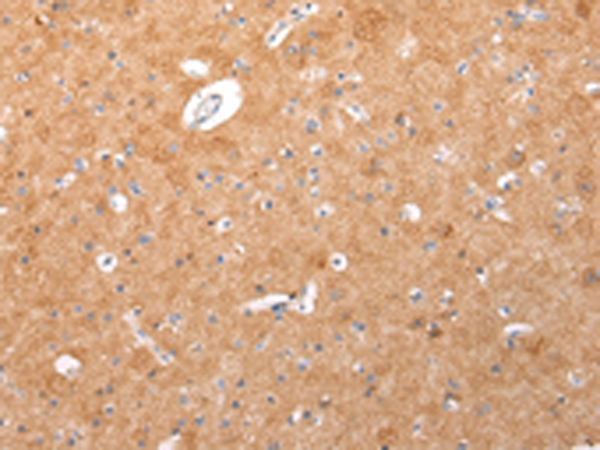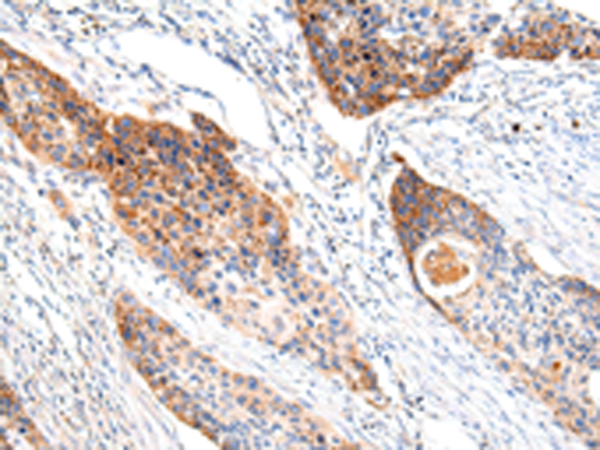


| WB | 咨询技术 | Human,Mouse,Rat |
| IF | 咨询技术 | Human,Mouse,Rat |
| IHC | 1/10-1/50 | Human,Mouse,Rat |
| ICC | 技术咨询 | Human,Mouse,Rat |
| FCM | 咨询技术 | Human,Mouse,Rat |
| Elisa | 1/1000-1/2000 | Human,Mouse,Rat |
| Aliases | λlight chain |
| WB Predicted band size | 25 kDa |
| Host/Isotype | Rabbit IgG |
| Antibody Type | Primary antibody |
| Storage | Store at 4°C short term. Aliquot and store at -20°C long term. Avoid freeze/thaw cycles. |
| Species Reactivity | Human |
| Immunogen | Synthetic peptide of human Lambda Light chain |
| Formulation | Purified antibody in PBS with 0.05% sodium azide and 50% glycerol. |
+ +
以下是关于RAB25抗体的3篇参考文献及其简要摘要:
1. **"RAB25 confers resistance to apoptosis in ovarian cancer cells through regulation of Bcl-2"**
- **作者**: Cheng KW et al.
- **摘要**: 该研究揭示RAB25在卵巢癌细胞中通过上调抗凋亡蛋白Bcl-2的表达抑制细胞凋亡,促进肿瘤存活和进展。实验利用RAB25抗体验证其在卵巢癌组织中的高表达及其临床意义。
2. **"RAB25 regulates EGFR-Akt signaling to potentiate cancer progression"**
- **作者**: Cheng JP et al.
- **摘要**: 研究发现RAB25通过增强表皮生长因子受体(EGFR)的稳定性及下游Akt信号通路激活,促进肿瘤细胞侵袭和转移。研究中采用RAB25抗体进行免疫组化分析,显示其与乳腺癌患者预后不良相关。
3. **"RAB25 promotes autophagy-mediated survival in colorectal cancer by regulating autophagosome-lysosome fusion"**
- **作者**: Tong M et al.
- **摘要**: 该文献表明RAB25在结直肠癌中通过促进自噬体-溶酶体融合增强细胞自噬活性,从而帮助癌细胞在营养匮乏条件下存活。研究通过RAB25抗体检测发现其高表达与患者化疗耐药性相关。
4. **"RAB25 as a biomarker for gastric cancer progression and therapeutic target"**
- **作者**: Zhang Y et al.
- **摘要**: 研究证实RAB25在胃癌组织中的异常表达可通过调控Wnt/β-catenin信号通路促进肿瘤侵袭和转移。利用RAB25抗体的实验显示其作为胃癌预后标志物及潜在治疗靶点的价值。
以上文献均聚焦RAB25在癌症中的作用机制及抗体应用,涵盖卵巢癌、乳腺癌、结直肠癌和胃癌等研究领域。
RASA4 (RAS p21 protein activator 4), also known as CAPRI (Ca²⁺-promoted Ras inactivator), is a member of the GTPase-activating protein (GAP) family that negatively regulates RAS signaling by accelerating GTP hydrolysis in RAS proteins. Primarily expressed in hematopoietic and immune cells, it interacts with both RAS and Rap1 GTPases, modulating pathways critical for cell proliferation, differentiation, and immune responses. Its activity is uniquely regulated by calcium ions, enabling dynamic control of RAS/MAPK signaling in response to extracellular stimuli.
Research highlights RASA4's dual role in cellular regulation: suppressing oncogenic RAS activity while paradoxically promoting survival in T cells during chronic infections. Dysregulation of RASA4 has been implicated in various pathologies, including cancer metastasis, autoimmune disorders, and abnormal angiogenesis. In leukemia and solid tumors, reduced RASA4 expression correlates with enhanced RAS signaling and poor prognosis.
RASA4 antibodies are essential tools for investigating these mechanisms through techniques like Western blotting, immunohistochemistry, and flow cytometry. They enable precise detection of RASA4 expression patterns across tissues and disease states, facilitating research into its therapeutic potential as a biomarker or target in precision oncology and immune modulation. Current studies focus on its context-dependent roles in tumor suppression versus immune evasion, particularly in the tumor microenvironment.
×